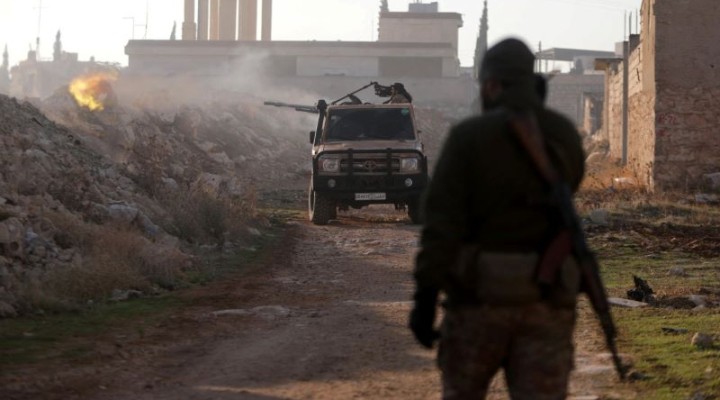Will the attack on Aleppo herald regime change in Syria Iran and Iraq?

Why did Erdogan join this plot, and how could it backfire, even leading to war with Turkey?
We are witnessing a “preliminary” rebirth of the 2011 scenario, prepared by the same groups currently involved in the attack on Aleppo in a way that astonished Syrian officials and its Russian partners. This surprise is reflected in the attacking forces’ control of more than half of Aleppo in less than a day, as well as the Syrian Army units’ tactical withdrawal from the city to avoid further losses and reposition themselves in preparation for a larger effort to retake the city and expel the attacking forces, as happened several years ago. The green buses will return in the coming weeks or months.
Syrian opposition organisations led by Hay’at Tahrir al-Sham (previously Jabhat al-Nusra) coordinated these operations with foreign forces, which the Syrian Army did not name but are believed to include Ukrainian, Turkish, and mercenaries. These events are part of a secret American-Israeli-Turkish plot that has been ongoing for months or years.
The current events in Syria are a direct reenactment of the United States 1991 scenario in Iraq, which involved the imposition of a stifling starvation embargo, followed by a military invasion and occupation 12 years later, ultimately leading to a regime change. What applies to Iraq may not apply to Syria, which has a strong army, a loyal popular base, a strategic ally in Russia and its president Vladimir Putin, a resistance axis led by a strong Iranian military and possibly nuclear power, and well-armed ideological arms dispersed throughout Lebanon, Iraq, Yemen, and occupied Palestine. There’s a chance the second Syria scenario could fail like the first.
Benjamin Netanyahu, the Israeli Prime Minister, is directly involved in this aggression, not only because he exposed his participation by accusing Syrian President Bashar al-Assad of “playing with fire” by supporting Hezbollah and refusing all American and Israeli pressures and threats to prevent the passage of modern Iranian missiles and military equipment to Hezbollah, but also because the airstrikes carried out by Israeli planes on the Lebanese-Syrian border crossings
When the Syrian Army challenges this plot and defends Aleppo, it does so not just to preserve Syrian sovereignty and territorial unity, but also to safeguard Iran, the head of the Resistance Axis, and Russia’s strategic interests. Netanyahu has consistently stated that he accepts the cease-fire agreement in Lebanon to focus on battling Iran and eradicating the Resistance and all of its brigades in the Gaza Strip.
Hakan Fidan, Turkey’s Foreign Minister and former intelligence chief acknowledged in a press conference today, Saturday, that Turkey has no involvement in the present military clashes in northern Syria’s Aleppo and Idlib provinces. However, these guarantees do not persuade anyone, as none of the factions involved in this attack can fire a single shot from a hunting rifle at a bird in northern Syria without the knowledge and agreement of Turkish intelligence, which finances, weapons, and defends them.
The involvement of President Recep Tayyip Erdoğan and his cabinet as well as Turkish national security and relations with Russia could have negative consequences. This attack on Aleppo does not violate the Astana agreements or the Sochi understandings, which require the departure of all “armed groups” from Idlib and its surrounding region. Perhaps the joint Syrian-Russian airstrikes that attacked these groups yesterday and killed over 500 of their fighters could be a precursor to a Turkish-Russian military conflict.
Let’s assume that President Erdogan, who openly expresses his ambitions in Syrian Aleppo and Iraqi Mosul, both of which he considers to be Turkish territories, intends to drive out Syrian forces from Aleppo and establish his allies in the armed Syrian opposition as rulers there, a strategy he has already implemented in Idlib and other areas his forces have occupied in northern Syria, to relocate the majority of Syrian refugees from Turkey. In that case, he is wrong in this estimation, and the opposite may happen.
The Al-Nusra Front and its fighters’ use of drones and modern missiles in the Aleppo war, which some reports claim originated in Ukraine and were under the supervision of Ukrainian military advisors, clearly violates all Russian red lines and exposes Turkey’s previously hidden role in the Ukrainian conflict.
When I met with Syrian President Bashar al-Assad for about five hours at his home in May 2023, he informed me that he does not trust President Erdogan and will only meet him once all Turkish forces have left Syrian soil. He will not waive this restriction in any circumstances. I was not shocked by President Assad’s rejection of all President Erdogan’s demands for peace, as well as his refusal to hold a bilateral summit with the Syrian president under President Putin’s sponsorship unless Russia made a clear and assured commitment to withdraw from Syrian territory.
It doesn’t look like this new plan by the US, Israel, and Turkey to split Syria and change its government will work in Netanyahu’s plan to redraw the maps of the region under the Israeli flag has much of a chance of succeeding. We do not believe Iran and Russia will stand quietly in this regard for one simple reason: Syria’s loss would pave the way for the downfall of the Iranian and Russian governments, as well as Iraq.
 TheAltWorld
TheAltWorld 
0 thoughts on “Will the attack on Aleppo herald regime change in Syria Iran and Iraq?”